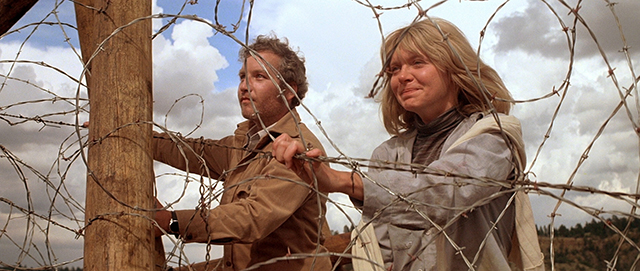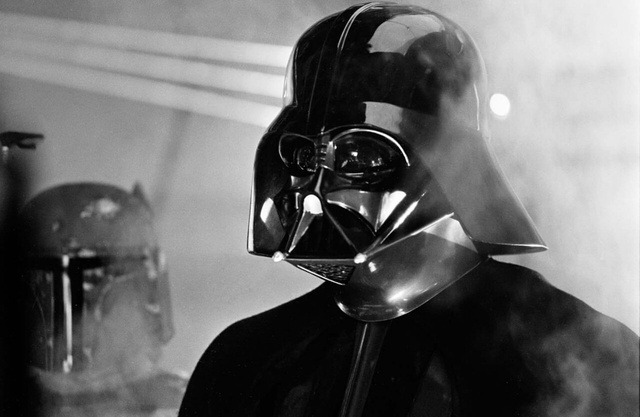 A famous “sneaking on government base” scene.
A famous “sneaking on government base” scene.
I’m currently working with a writer who’s writing an elaborate spy/science-fiction script that involves infiltrating the US Government. The final 45 pages are the main character infiltrating a series of complex checkpoints and well-guarded areas on a giant base created by the most advanced military in the world.
When that first draft came in, the script completely fell apart in those final 45 pages. Often, what would happen, is there would be a checkpoint, and the hero would hide in the back of a car, allowing him to sneak through the checkpoint. Then he’d get to a building he’d have to breach. So he’d sneak around the back and override the passcode to open a door.
There were almost a dozen moments like this, which is why I said to the writer: The reason this ending falls apart is because every time your hero encounters a challenge, the challenge isn’t difficult. He hides in the car. The guard walks around the car. He pauses for a moment, creating a teensy bit of suspense. And then he tells the driver to go ahead.
In other words, THE WRITER IS THE HERO’S GUARDIAN ANGEL. The writer is a protector. He is on the hero’s side. Therefore, whenever a problem pops up, he’s going to make sure that the hero gets out of that problem just fine.
This is the WORST approach you can have to writing a script.
When you write a script, YOU WANT TO BE THE HERO’S WORST ENEMY.
You want to be the VILLAIN.
Even bigger than the actual villain in your story. Because the worse of a villain you are, the better your script is going to be.
Let me give you an example.
Go back to the scene where the main character is hiding in the car. We’ll say he’s hiding in a compartment in the trunk. The Guardian Angel Writer will never have anybody even open that trunk. The Guardian Angel Writer is a screenplay killer because no moments in his script have any tension at all.
The Good Buddy Writer *will* have the guard open up the trunk and look inside. But something will happen at the last second – another guard will call him away for a more ‘important’ matter – that keeps our hero protected. This Good Buddy Writer is definitely better than the Guardian Angel Writer because he’s created more suspense out of the scene. But he’s still helping our protagonist out when he needs it.
You know what the Villain Writer does? He has that guard open up the trunk. He has that guard dig around in that trunk. And you know what he has the guard do next? Think about it for a second. You’re the villain. You want to make things as bad for the hero as possible. So… YOU HAVE HIM DISCOVER YOUR HERO.
Because guess what? If he discovers the hero? You’ve got yourself a scene now! And not just an okay scene. A MEMORABLE scene. Because now we, the reader, are wondering how the heck the hero is going to get out of this. Which is the ideal place to have your reader in.
Why don’t writers do this more often?
Simple. Because they don’t have any clue how to get the hero out of that situation. So they’d rather avoid the situation than give themselves a difficult job to do. But let me make this clear. The more times you are the Villain Writer to your hero, the better the chances are that you are writing something great.
In one of the great sequels of all time, The Empire Strikes Back, a big chunk of that film’s finale is dedicated to the build-up of encasing Han Solo in carbonite. The Guardian Angel or the Good Buddy Writer would’ve found a way to save Han Solo from this fate. Luke or Leia would’ve gotten to him in time, shot or sliced up some stormtroopers, grabbed Han, and it’s off to the Millennium Falcon we go!
 This needs to be you!
This needs to be you!
Not the Villain Writer. The Villain Writer encases Han in carbonite. Cause that’s the story direction that’s going to get the biggest reaction out of the audience. They’re going to be confused. This is not supposed to happen. Why couldn’t he have gotten away!?
Getting back to the spy sci-fi script, let’s look at that final obstacle where the hero has to sneak into the building. The way it was written, the hero did an override on the code panel. My first question to the writer was, “Where are the cameras?” “Aren’t there cameras outside this building so they can monitor people who are trying to break in?”
The writer began rambling, “Well, it’s not that kind of facility. They don’t usually have people in this area so it wouldn’t be expected that someone would be trying to break in here…” I said to him, “Listen to yourself. Does that sound like the real world AT ALL??” OF COURSE they’re going to have cameras! These days, they’re going to have drones combing the facility as well. They’re going to have every single inch of this base secured.
The writer looked at me with a blank stare and I knew exactly what that blank stare meant. It was the writer thinking to himself, “Well if I put all that in there, I’m going to have to figure out a way for my hero to get past it.”
EXACTLY!
And when you start writing this way, THAT’S WHEN YOU START BECOMING A GREAT WRITER.
Let me make something clear cause screenwriters seem to forget this all the time. The more CERTAIN the reader is of what’s going to happen next in your script, the more bored they are. The more UNCERTAIN the reader is of what’s going to happen next, the more engaged they are.
When you are the Villain Writer, you are constantly creating UNCERTAIN SCENARIOS. I have no idea how the hero in this spy sci-fi script is going to get past drone security. WHICH IS WHY I WANT TO KEEP READING! So I can find out. In contrast, if you’ve written an entire script holding your hero’s hand through all the obstacles, I know that once we get to this base, the hero’s going to figure it out. I’m going to be CERTAIN of the hero’s success. Which means I’m BORED.
Likewise, when we get to that back door, don’t place a number code on it. Just have it be a steel door with no apparent way to get in. Hell, if you want to be a true villain, TAKE THE DOOR AWAY COMPLETELY. Actually, let’s go one step further. In the planning stages of infiltrating this base, this door was a key part of the plan. It was, according to their reconnaissance, the least guarded door on the base. So it’s essential to their plan.
What would a true Villain Writer do? When the hero gets there, THERE IS NO DOOR. It’s no longer there. NOW WHAT???
You should love that phrase as a screenwriter: NOW WHAT??
Place your hero in a bunch of situations where the next thought is, NOW WHAT?
Because what does “Now What” imply? It implies UNCERTAINTY.
I’ll leave you with one of my favorite Villain Writer moments, just to show you that you can be a Villain Writer in any genre. Not just action or spy movies. It occurs in the romantic comedy, Notting Hill.
Anna, the movie star, has invited William, the nobody local dude, on a first date. Now, the Guardian Angel Writer is going to have William show up to her hotel room. She’s going to open the door. There’s going to be some cutesy romantic comedy banter. And off they go on their date!
Instead, what happens?
William shows up, and when the door opens, it’s some random guy. The guy then walks William into the middle of a press junket. The Villain Writer makes sure that NOTHING is easy for their hero. William is forced to pretend he’s part of a magazine and must ask questions to all of the stars of Anna’s latest movie before finally getting a chance to see her.
Richard Curtis, the writer of Notting Hill, is actually really good at being a Villain Writer. Later in the movie, William comes over to Anna’s hotel for another date, only to find her a-hole ex-boyfriend (played awesomely by Alec Baldwin) in the room with her. She had no idea he was going to show up.
I am so convinced of the value of today’s lesson that I challenge you to go into your current screenplay and find one of the biggest scenes in it, and rewrite the scene being as big of a Villain Writer as you can possibly be to your hero. I GUARANTEE YOU that the scene will get better.
Go try it and report back!

